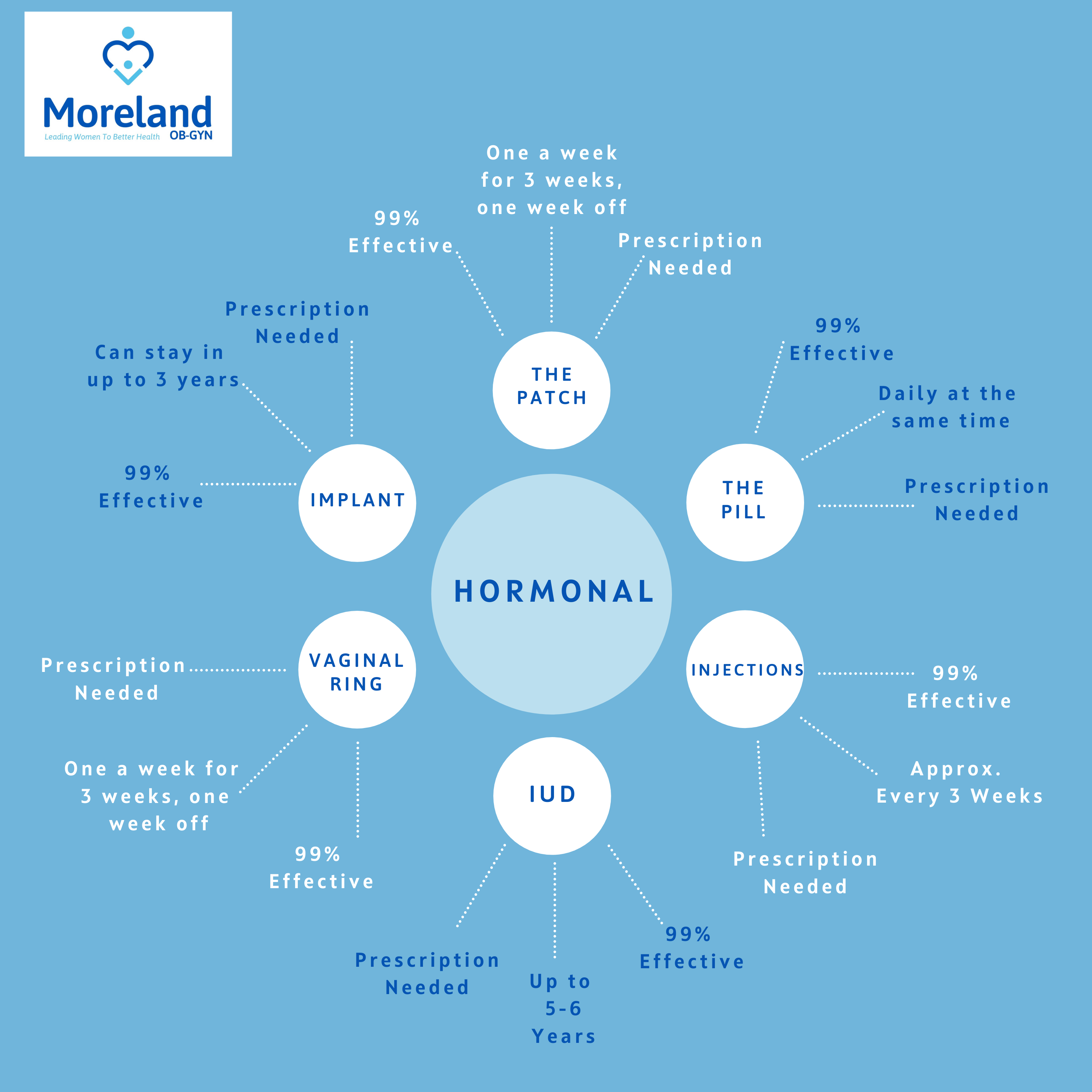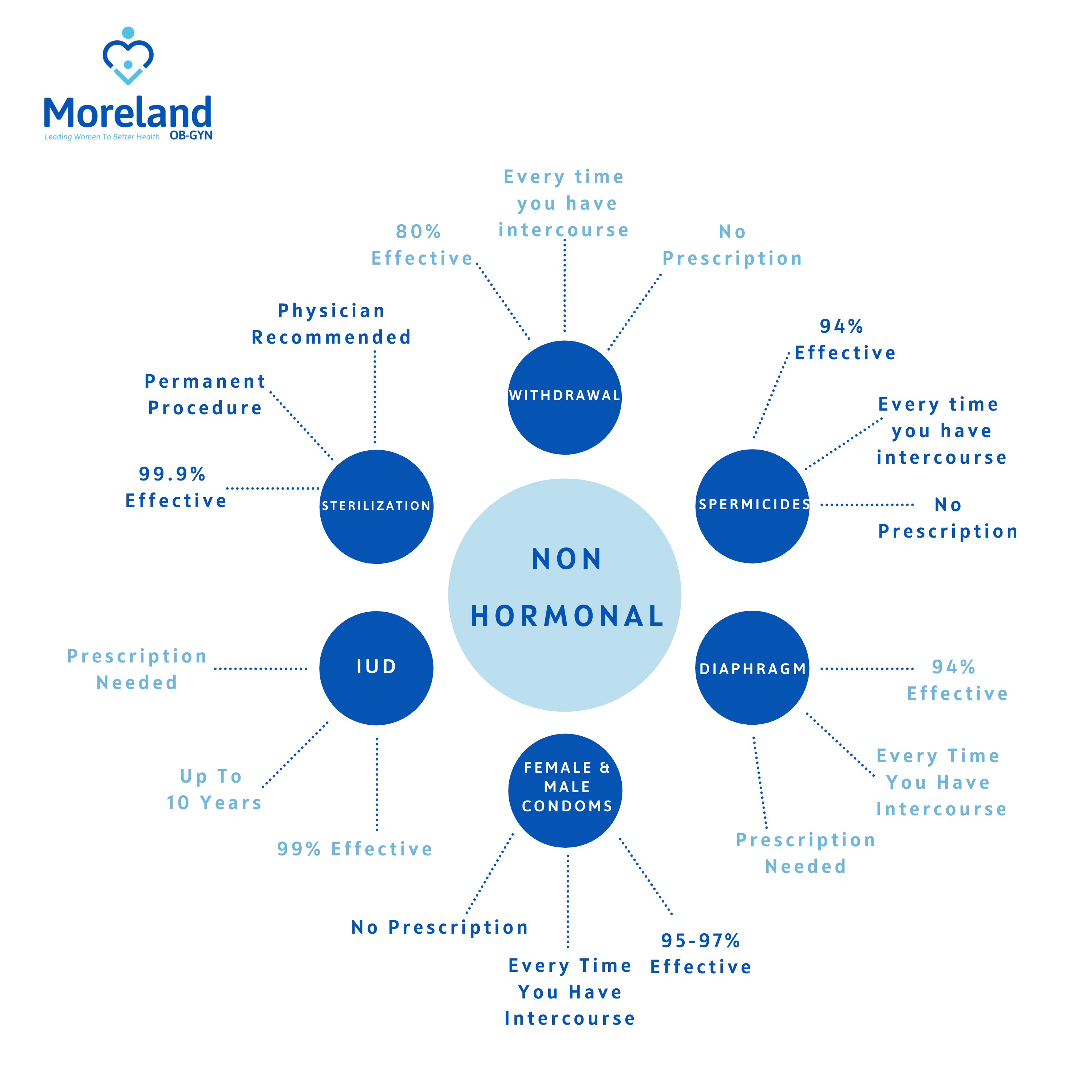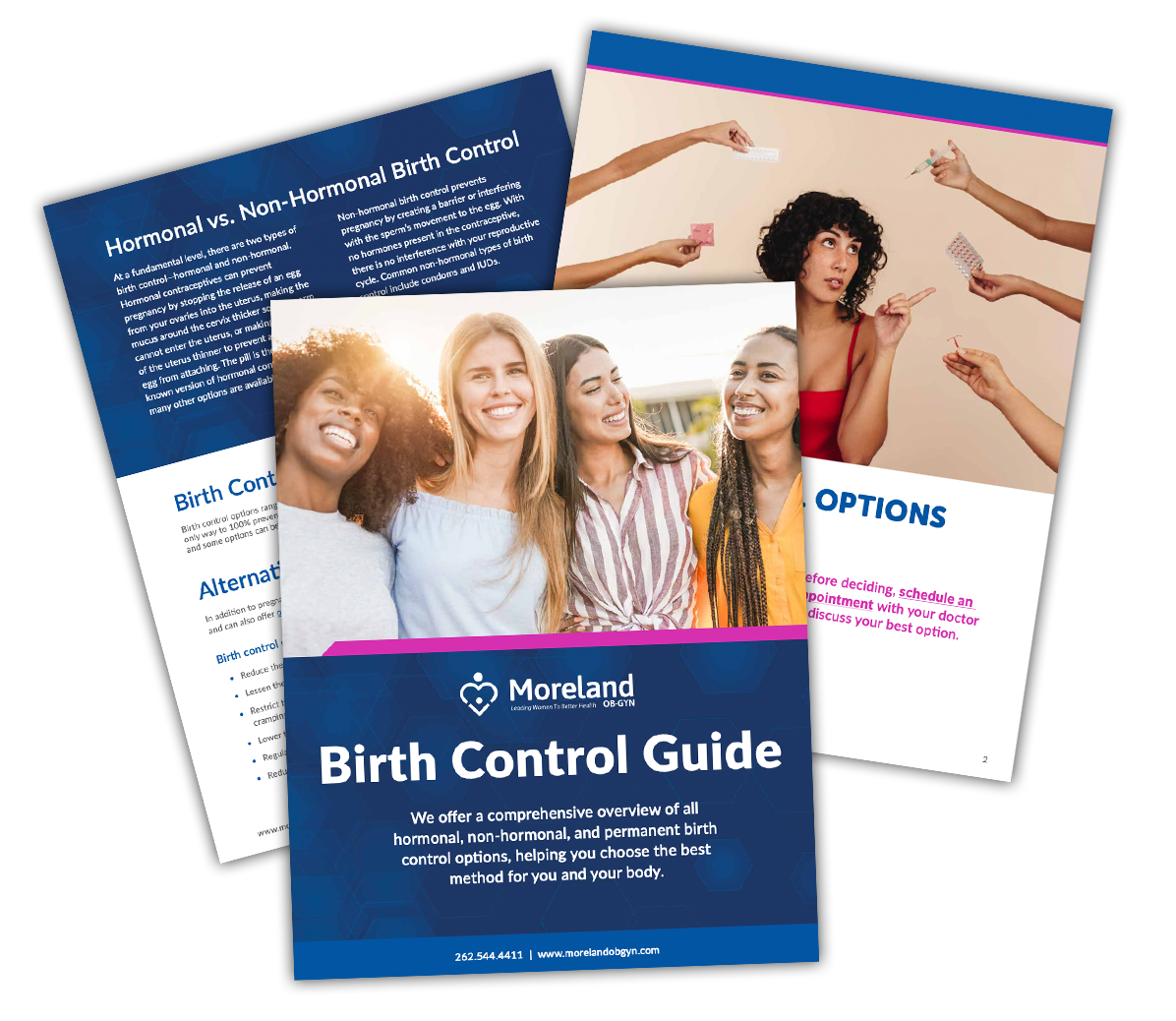Birth control (contraceptives) can help prevent pregnancy when you don’t want to have a baby, but it can also help regulate the symptoms that come along with your monthly period. There are many types of birth control options with different levels of effectiveness and hormones, and the choices can get pretty confusing.
The accredited team at Moreland OB-GYN has put together a comprehensive guide to give you a better understanding of the types of birth control available to our patients. Before making a decision, schedule an appointment with your doctor to discuss the best option for you.
.png?width=300&name=BC%20Page%20(1).png) At the very basic level, there are two types of birth control—hormonal and nonhormonal. Hormonal contraceptives can prevent pregnancy by stopping the release of an egg from your ovaries into the uterus, making the mucus around the cervix thicker so the sperm cannot enter the uterus, or making the lining of the uterus thinner to prevent a fertilized egg from attaching. The pill is the most widely-known version of hormonal contraceptives, but many other options are available.
At the very basic level, there are two types of birth control—hormonal and nonhormonal. Hormonal contraceptives can prevent pregnancy by stopping the release of an egg from your ovaries into the uterus, making the mucus around the cervix thicker so the sperm cannot enter the uterus, or making the lining of the uterus thinner to prevent a fertilized egg from attaching. The pill is the most widely-known version of hormonal contraceptives, but many other options are available.
Nonhormonal birth control prevents pregnancy by creating a barrier, or interfering with the sperm movement, to the egg. With no hormones present in the contraceptive, there is no interference with your reproductive cycle. Common nonhormonal types of birth control include condoms and IUDs.
Birth control options range in their effectiveness when preventing pregnancy. The only way to 100% prevent pregnancy is abstinence, however, many birth control options have proven to be highly effective. Some options can be paired together to provide a greater barrier against pregnancy.
In addition to pregnancy prevention, birth control can be used to control hormone-related issues and can also offer other health benefits.
Birth control can help:

Learn about our adolescent contraceptive counseling services here!

Hormonal birth control can be up to 99% effective when used correctly, making it the most reliable birth control option. While hormonal birth control may be very effective, staying consistent is essential, as missing a dose may result in pregnancy.
Oral Contraceptive Pills (OCPs), also known as combination birth control pills, contain estrogen and progestin to prevent pregnancy. The combination of these hormones stops a woman from ovulating, preventing the ovaries from fully developing and releasing an egg. It also thickens the mucus inside the cervix (making it difficult for the sperm to reach the egg) and thins the lining o the uterus (preventing a fertilized egg from implanting itself). The pill should be taken once a day and is most effective when taken consistently.
Like the combination birth control pill, the patch contains estrogen and progestin hormones and works by stopping ovulation. The patch is placed on certain parts of your body, and the hormones are administered through the skin. It is placed once a week for three weeks with one week off.
The vaginal ring, or birth control ring, is a small, flexible plastic ring inserted inside the vagina (similar to a tampon) once a month. It delivers estrogen and progestin into the body and works similarly to the pill in terms of pregnancy prevention. You will place the ring in your vagina for three weeks and then remove the ring for one week when menstruation occurs. After that week, you will insert a new vaginal ring to start a new cycle.
Learn more about the vaginal ring and other birth control options that contain estrogen now.
Progestin-Only Pills (POPs), often called the mini-pill, only contain progestin and have a smaller dose than the combination pill. This form of birth control may be a good option for women who are breastfeeding or have a history of blood clots and shouldn’t take estrogen; much like the combination pill, the Progestin-only pill thickens the cervical mucus so the sperm can’t reach the egg. It also thins the cervical lining, making it difficult for a fertilized egg to implant.
This pill suppresses ovulation, but not as consistently as the combination pill – making it about 90% effective with typical use. Although, a newer generation progestin-only pill, Drospirenone (Slynd), is now available and has a higher dose of progestin, making it more like a combination pill and more effective.
The Depo-Provera injection is administered in the buttocks or upper arm every three months by a nurse or doctor. The injection contains progestin, and its effects are similar to the progestin-only pill when preventing pregnancy. This form of birth control may be a good option for women who have trouble remembering to take the pill every day. However, it is still critical to remember to schedule follow-up shots every 12-13 weeks.
A hormonal intrauterine device (IUD) is a small, T-shaped device inserted into the uterus by a healthcare provider and can last up to ten years unless removed earlier. The hormonal IUD contains progestin, released into your uterus, and has similar effects as progestin-only pills when preventing egg fertilization and implantation.
Nexplanon is a subdermal, hormonal contraception implant placed in the arm by a doctor and lasts for three years, during which it slowly releases progestin. It is the most effective form of hormonal contraception, with a failure rate of 0.05%. It works by preventing ovulation, thickening mucus, and thinning the lining of the uterus.

Non-hormonal birth control methods carry fewer side effects than hormonal methods. They are great options for women who do not wish to change their body’s natural cycle, do not have frequent intercourse, or are looking for a backup method along with their hormonal birth control.
Natural family planning is when a woman uses one of three methods — Standard Days Method, Ovulation Method, and Symptothermal Method — to identify the most fertile days of her menstrual cycle. This method is done by tracking when she is ovulating and avoiding intercourse or using a barrier contraceptive method during ovulation.
Learn more about natural family planning now.
Female and male condoms are barrier contraceptives that are either rolled on the penis or placed within the vagina to prevent sperm from reaching the egg. Condoms are the only birth control method that, when used properly, protects against HIV and sexually transmitted diseases. They are also the most readily available and affordable form of birth control and are 98% effective at preventing pregnancy if used every time.
Like a hormonal IUD, a copper IUD is a small, T-shaped device placed within the uterus by a healthcare provider and can prevent pregnancy for up to ten years. A copper IUD does not contain hormones and will not alter a woman’s natural cycle. It works by releasing copper into the uterus and creating a toxic environment for sperm, preventing the sperm and egg from meeting.
A diaphragm is a dome-shaped silicone cup that's inserted into the vagina several hours before sexual activity. It is a physical barrier for the cervix, preventing sperm from reaching the egg. To be most effective, a woman should use a diaphragm in combination with Spermicide. A prescription is required, and a woman should be properly fitted for a diaphragm by a healthcare physician.
Spermicide is a liquid, foam, or film substance placed into the vagina with an applicator before having sexual intercourse. It works by killing the sperm before it reaches the egg. It is strongly advised to use Spermicide in conjunction with a condom or diaphragm because it provides poor pregnancy prevention when used alone. Spermicide, like condoms, is a less expensive and widely available means of birth control. However, Spermicide can cause vaginal irritation.
Withdrawal, or the pull-out method, is when a man takes his penis out of a woman’s vagina before ejaculation. The withdrawal method is about 80% effective but can be easily combined with other birth control options to improve pregnancy prevention.
Permanent birth control options include minor procedures that sterilize a man or woman. While these procedures can be reversed, the reversal may not always be successful.
Tubal ligation, often known as "tying your tubes," is a surgical technique in which the fallopian tubes are closed off, tied, banded, cut, sealed with an electric current, blocked by scar tissue from tiny implants, or removed. By closing off the fallopian tubes, an egg can no longer travel to the ovaries, and sperm can not travel up the fallopian tubes to reach the egg. Tubal ligation does not affect a woman's monthly menstrual cycle. Complete removal of the tubes can also decrease the risk of ovarian cancer. Learn more about tubal ligation now.
Vasectomy is an outpatient male procedure where the vas deferens, tubes where sperm travels on its way out of a man’s body, are obstructed to prevent sperm from entering the semen. Once the tubes are tied, sperm can no longer be ejaculated. Following the procedure, it will take 15-20 ejaculations to completely clear the tubes of sperm, so it’s important to continue using birth control methods. The female partner may need to use a backup form of contraception for up to 6 months after a vasectomy. Learn more about vasectomy now.
Based on your preferences, your Moreland OB-GYN can work with you to determine the best birth control options for you and your body. Schedule an appointment today.
At Moreland OB-GYN, we specialize in gynecological and obstetric health care and prioritize the needs of our patients. We hope you’ll connect with us to help answer your birth control questions, and we hope you’ll turn to our experts as a trusted resource for information.

Phone: 262-544-4411
Fax: 262-650-3856
Monday-Thursday:
7:30 am – 6:00 pm
Friday:
7:30 am – 4:00 pm



